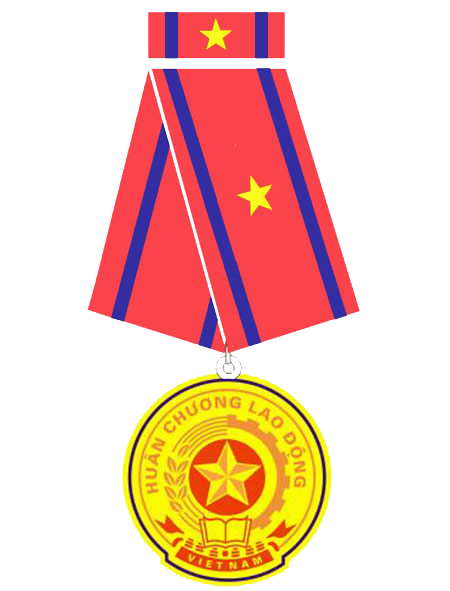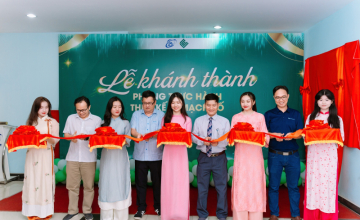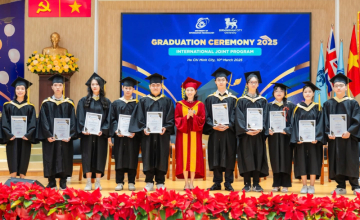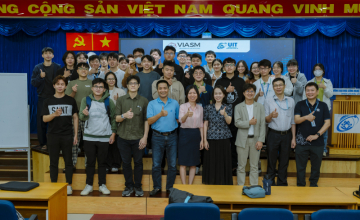1. Introduction
1.1 Academic training objectives:
Master's degree training helps learners to master theory, high level of practice, ability to work independently, creativity and ability to detect and solve problems in specialized training. Master's programs must ensure the core knowledge of the environment, and bring into play the strengths of the specialization of the school's environment sciences, including: knowledge technology and machine learning; Natural language processing; Computer vision
Learners have the basic knowledge and deep knowledge, have a solid methodology and have the ability to apply the modern achievements of the computer sciences to the reality to meet the high demands of the society, able to study and develop at high levels, as well as to be possible to play a leadership role in managing and actively contributing to the advancement of science and technology. The training is conducted according to research oriented and application oriented, particularly:
- Research-oriented curriculum: to provide learners with in-depth knowledge of the discipline, specializations and methods of scientific research so that they can independently study and develop their views. science, initially able to form scientific ideas, discover, explore and test new knowledge; be capable of performing work in research, teaching, consulting and policy making positions or other positions in the branch or specialized field; be able to continue to participate in doctoral degree programs.
- Application-oriented training: to help learners improve their professional knowledge and skills in professional activities; Having the ability to work independently and creatively; be able to design products, apply research results, detect and organize complex tasks in professional activities, promote and effectively use specialized knowledge in the implementation specific tasks, suitable to practical conditions at economic agencies, organizations and units; be able to learn some additional basic knowledge and research methods as required by the doctoral degree to further participate in the doctoral degree program.
Basic knowledge and expertise is set at the center, creating conditions for learners to increase their motivation to study, to help students develop knowledge, improve professional capacity, ability research and application in practice.
1.2 Form and time of academic training:
The form of training is 24 months (02 years)
1.3 Viewpoints for building academic training programs
- The Master of Science (MSc) degree program in Computer Science must be aimed at serving the objectives of training, providing in-depth knowledge of Computer Science, leading learners to study professional knowledge or can be proficient to serve the needs of the society.
- Basic knowledge and expertise is set at the center, enabling the trainees to increase their motivation to study, to help them develop knowledge, Research and application in practice.
- Learners in Computer Science are able to integrate into higher education and international studies.
1.4 Output standards
The Master of Science (MSc) Program in Computer Science will provide learners with the basic knowledge and skills they need, as well as the international learning environment. The goal is to help learners after graduating be able to work in a high-tech environment, both in Vietnam and abroad. Learners will also be trained in scientific research methods, creativity, and ability to continue to study and research in advanced environments around the world.
1.4.1 Knowledge
- The knowledge is concentrated in the areas of development of intelligent systems and knowledge base, image processing, natural language processing and human interaction, along with a number of related fields. These are fields that are currently worldwide interested in research and development.
- For research orientation: Knowledge of Computer Science, along with the improvement of knowledge on scientific research methods so that learners can continue to study and study at higher level.
- For application orientation: Graduates can apply the specialized knowledge of the KHMT to solve problems in reality, serving the increasing needs of human beings.
1.4.2 Skills
- Besides mastering the practical skills, learners also have the skills to analyze, design, argue and experiment in a systematic and scientific way for large complex problems.
- Self-study, research, creative skills to solve complex problems.
1.4.3 Qualities, attitudes
- Strictly obey the law, comply with regulations in the profession in the field of information technology, especially respect copyright, intellectual property.
- To actively work for the common interests of the community, for the cause of development of the information technology in Vietnam.
- Self-study and self-improvement.
1.4.4 Capacity and position of employment
- Be able to participate in development projects, exploitation and management of information systems, especially intelligent systems, problem solving systems of high complexity; be able to scientifically approach new issues in information technology; Ability to communicate professionally in English.
- For research orientation : After graduation, the Master of Science in Computer Science has the capacity to self-study and organize research; be able to continue research at the doctoral level; be able to work in universities and research institutes, and be able to broaden their knowledge of other relevant fields in the IT industry through select courses.
- For application orientation: Having the capacity to apply the results of the Computer Science to the real economy towards the knowledge economy as well as being able to play a leading role in developing and contributing positively to the development. of science and technology.
2. CURRICULUM
2.1 Knowledge blocks
|
Knowledge blocks |
Number of credits |
Note |
||
|
Research Orientation |
Application Orientation |
|||
|
General Knowledge |
Philosophy |
3 |
3 |
|
|
Mathematics |
4 |
4 |
|
|
|
English |
|
|
According to the learning outcomes standards |
|
|
Core Knowledge |
Compulsory |
8 |
8 |
|
|
Scientific research methodology |
2 |
|
Research Orientation |
|
|
Select following specialty |
≥ 12 |
≥ 12 |
|
|
|
Free choice |
≥ 16 |
≥ 23 |
|
|
|
Graduation thesis |
15 |
10 |
|
|
|
Total |
³ 60 |
³ 60 |
Learners can accumulate more than 60 credits |
|
2.2 ACADENMIC TRAINING PLANNED EXPECTATION
|
|
Subject code |
Subject name |
Note |
|
Module 1 (4 months) |
PH2001 |
Philosophy |
|
|
MA2001 |
Mathematics for computers |
||
|
CS2101 |
Knowledge and application technology |
||
|
CS2102 |
Algorithms and problem solving methods |
||
|
Module 2 (4 months) |
|
Narrow options subjects |
Learners choose to study ≥ 12 credits |
|
|
02 free electives |
|
|
|
Module 3 (04 months) |
|
04 free electives |
- Learners choose the modules to ensure complete the sufficient credits under the program. - Learners choose the research orientation, prepare thesis and submit after this module is finished |
2.3 Research Orientation
|
|
Subject code |
Subject name |
Note |
|
Thesis Implementation Stage (15 credits) |
CS2205 |
Scientific research methodology |
|
|
CS2501 |
Graduation thesis (15 credits) |
- Learners carry out the graduation thesis. - Publishing scientific articles |
2.4 Application Orientation
|
|
Subject code |
Subject name |
Note |
|
Module 3 (04 months) |
|
04 free electives |
- Learners choose the modules to ensure complete the sufficient credits under the program. - Learners choose the research orientation, submit the thesis after this module is finished |
|
Thesis Implementation Stage (10 credits) |
CS2503 |
Graduation thesis (10 credits) |
- Learners carry out the graduation thesis. |







